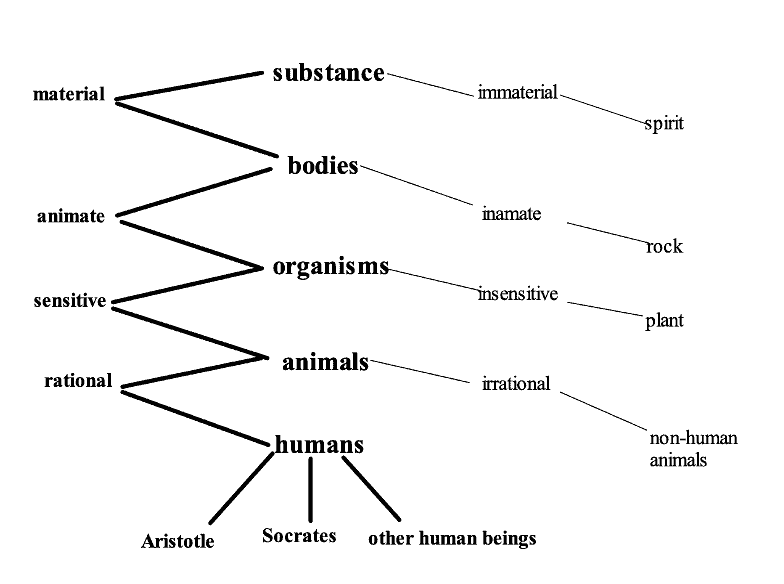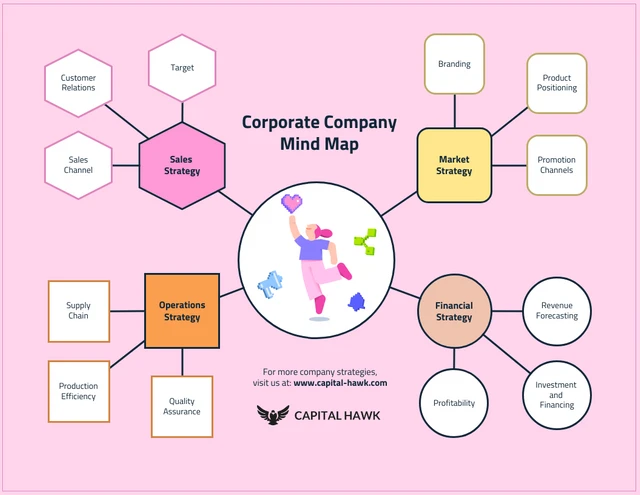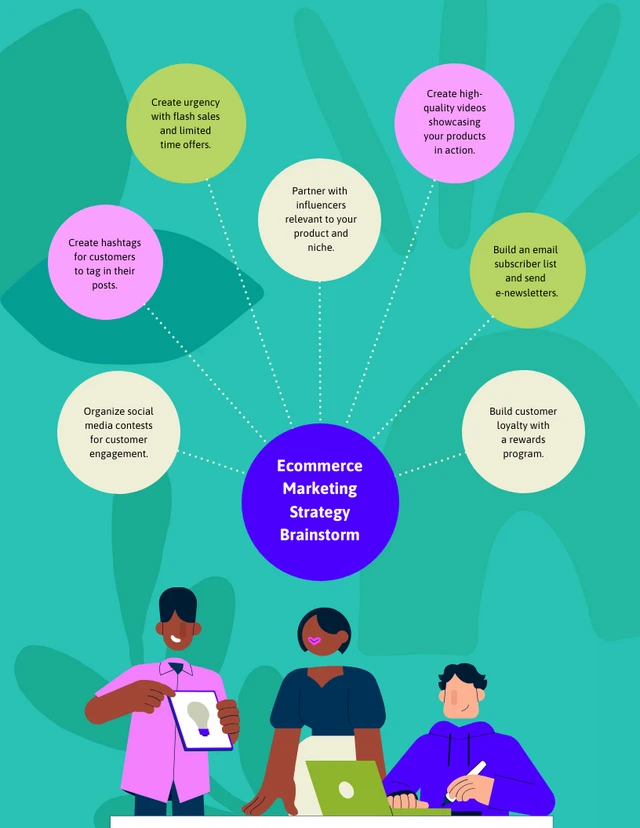
Do you ever feel overwhelmed by information overload?
You’ve got work projects (or school) to deal with, things going on in your personal life, and events and vacations to plan. Is there any escape from it all?
I’m sure you’ve tried notes and to-do lists in vain, but that is more work.
If only there were a way to make sense of it all. It would help if you had a mind map to help organize information and make sense of everything.
In this post, I’ll show you how to use a Free Mind Map Maker Tool and mind map templates to bring your ideas to life.
Click to jump ahead:
- What is a mind map?
- Features of a mind map
- 7 benefits of mind maps
- Understanding the mind map concept
- Mind mapping techniques and tips
- Using Venngage as a mind-mapping tool
- Mind map templates
- Mind map examples
- Conclusion
What is a mind map?
Mind maps help you organize information and ideas in the same way that our brains make connections.
Here’s an example of a mind map.
Mind map definition
A mind map is a visual diagram representing ideas, tasks, or other items linked to and arranged around a central concept using a non-linear graphical layout.
Mind maps help visualize and classify ideas and are great tools for studying, problem-solving, and decision-making.
Key features of a mind map
Why are mind maps an effective tool for capturing and organizing your thoughts? To understand, we’ll need to understand its structure.
Central concept
Mind maps feature a central concept or topic in the middle of the page, often represented as an image or word.
This mind map explains the “Four P’s Copywriting Formula”, with the central idea prominently placed on the left (the main theme doesn’t always have to be in the middle of a mind map!).
Branches
From the main idea should extend multiple branches, which include information on sub-topics linked to the central idea.
This mind map shows how a central concept can be explored in depth by branching the main idea (in this case, team communication strategies) into more specific or actionable items.
Visuals
Mind maps often use visuals, including images, icons, graphics, and symbols, to enhance memory and engagement.
This mind map uses visuals to illustrate the job hiring process. Each step is color-coded and includes an icon or graphic representing the described step to enhance memory recall and engagement through visual cues.
Flexibility
With mind maps, there’s no structure or right or wrong way to create the end product. You’re free to add ideas and explore connections organically.
This mind map is non-linear and multidirectional, reinforcing the idea that there’s no right way to organize information. Connecting items in a mind map depends on how you think about the relationship between concepts.
7 benefits of using mind maps
Mind maps help us think in ways we’re not used to, which means you can expect many benefits. Let’s explore each in detail.
Aids with memory recall
Mind maps help you better remember and recall information. According to one research on its benefits in education, mind maps enhanced retention by 10-15%.
This mind map, such as this example on the reasons for jealousy, taps into our visual-spatial memory, making it easier to recall the information later than if we had just read it as text.

Helps you better understand ideas and concepts
Mind maps help you better understand ideas by visually breaking down and categorizing information in an easy-to-grasp format.
This mind map mirrors how our brains naturally make sense of information (by connecting dots and forming patterns), making it much easier to understand a concept like corporate communication.
Boosts creativity
By encouraging you to explore relationships between ideas in a free-flowing manner, mind maps make it possible to get creative and innovative.
This mind map branches out into different categories of marketing strategies, with further subcategories to encourage you to dig deeper. The overall shape also looks like an ‘8’, which could serve as a visual reminder or represent the continuous cycle of creativity and feedback essential in marketing.
Increases productivity
Mind maps can improve productivity by providing a clear visual outline of your tasks and goals, which makes it easy to identify priorities and allocate resources.
This mind map offers a structured overview of the project management process and can help transform complex project information into an accessible and actionable visual format.
Leads to better communication
Mind maps improve communication skills by promoting a better understanding of information, processes, and tasks among individuals.
This mind map visually presents critical strategies crucial during business interactions. It serves as a quick reference guide and improves one’s ability to negotiate and interact effectively in a business environment.
Cultivates critical thinking skills
Mind maps improve critical thinking skills by letting you see a problem from various angles, which helps establish connections between what may initially seem unrelated.
This mind map aids in critical thinking by laying out the basics of total quality management in a manner that requires interpretation, understanding, and application to real-world organizational challenges.
Improves problem-solving ability
Mind maps can help you solve problems effectively by enabling you to brainstorm solutions and evaluate the best course of action in a clear and structured manner.
This mind map lays out the career paths one could pursue with a sociology degree. It allows people with this degree to problem-solve career planning and make informed decisions about their future.
Understanding the mind map concept
Mind maps are effective because they mimic how the human brain organizes information and makes connections.
British psychology author Tony Buzan popularized mind maps in the 1970s during a TV show where he revealed how to use mind maps to harness our cortical skills — words, images, numbers, logic, rhythm, color, and spatial awareness.
Of course, mind maps are not that new, though.
They can be traced back to ancient times, with the first mind map attributed to Porphyry of Tyros from the 3rd century, who mapped the relationship between material and immaterial things.

Mind mapping techniques and tips
Mind mapping techniques refer to strategies and methods to organize information and create a mind map.
Though there are several mind-mapping techniques, I’ll guide you through one that’s fail-safe.
Choose a central idea first
Start by defining a clear idea that represents the main theme or topic. Place it in the center of your page with a circle or box around it. This is the ‘heart’ of your mind map.
Can you guess the central idea of this mind map? If you guessed company policies, you’re bang on the money!
Describe key ideas to support your central theme
After you have a central theme, it’s time to create branches to contextualize the topic you are mapping.
These branches act as the pillars of thoughts and should be defined through text, visually, or both!
This mind map template expands on the main topic with five critical pillars described with text and visuals and color-coded for easy recognition in the crowd of circles.
Draw sub-branches to refine information further
From your main branches, draw additional branches to represent sub-topics that break down complex ideas into more manageable chunks.
This mind map is an excellent example of each branch being split into specialized sub-topics that provide a more detailed understanding of the central concept by dissecting it into parts.
Use color to categorize information
Colors are a great way to differentiate between ideas, themes, or categories and make mind maps visually appealing.
Another bonus of using colors in mind maps is that they provide a creative way to organize information and make it easier to remember.
This mind map template uses colors strategically to differentiate between business objectives, action plans, and problems.
Use symbols and images to make mind maps appealing
Icons and symbols are visual tools that make your mind maps visually appealing.
More importantly, images are mnemonic devices that can improve recall and make mind maps a practical study or brainstorming tool.
This mind map shows various health categories such as exercise, diet, sleep, and stress management. But you could tell that immediately without reading and looking at the imagery.

Use cross-linkages
Cross-linkages show connections between different ideas or branches on a mind map, revealing how different concepts relate to each other and enhancing overall understanding.
Here are some other mind-mapping tips:
- Use single words or uncomplicated phrases.
- Use printed words, which are easier to read than joined-up or indistinct writing.
- Use the right tool to create a mind map. Though you can draw a mind map manually using pen and paper, using a digital Mind Map Maker is better because it lets you be more flexible, add visuals, and add easily share your creation.
Want to learn more about mind maps? Check out our other resources!
15+ Mind Map Examples to Organize Your Team and Inspire New Ideas
40+ Mind Map Examples To Help You Visualize Ideas
How to Use a Mind Map for Note Taking During Business Meetings
Using Venngage as a mind-mapping tool
Though pen and paper can be a great way to quickly create a basic mind map, it’s not the best method for creating one that is visually engaging and easy to share.
I recommend using a digital mind mapping tool like Venngage to create mind maps in seconds. And don’t worry—you don’t need any design skills since the tool has a drag-and-drop interface.
Here’s how to create mind maps with Venngage.
Step 1 – Sign up for a FREE Venngage account
Sign up for a free Venngage account using your email, Gmail, or Facebook account.

Step 2 – Pick a mind map template from our templates page
Go to our templates page to see our entire library of templates. Select the mind map templates on the left side panel to filter for mind maps.

Here, you’ll see all our mind map templates. PS: You can further even more for different types of mind maps such as business, concept, marketing, etc.

Step 3 – Edit one of our mind map templates
Once you find a template, click the “Create” button. This will take you to the sign-in or sign-up screen if you haven’t created an account.

Once signed in, you’ll have access to the mind map maker tool, where you can customize mind map templates.
Pretty straightforward so far, right?

Here’s a quick overview of some nifty customization options within Venngage.
- Click any node and use the ‘+’ or ‘-‘ to add or delete it.
- Change the text, icons, or graphics within the template.
- Add your brand colors to your mind map with a single click using My Brand Kit (available only for Business users).
Once you’re happy with a design, you can download it in PDF, PNG, and other formats (for Business plan users only) or share a link to your mind map for free.
Mind map templates
You’ve seen plenty of mind map templates by now, but why should you use one?
The benefit of mind map templates is that they help you save time and provide an easy starting point.
I mean, why create mind maps the hard way, where you’ve got to come up with design, layout, and graphics, when you can use a template where the hard work is already done for you?
You’ll find no shortage of mind map templates online (do a quick Google), but I recommend using Venngage templates, which have been created by professional designers.
Some of our mind map templates are free to use, while others require a small monthly fee. Sign-up is free, as is access to Venngage’s online drag-and-drop editor.
Mind map examples
In business, success relies on good ideas, and brainstorming is a great way to uncover them, as seen in this ecommerce marketing strategy mind map.
If you’re responsible for figuring out how to improve a process at the workplace, the best way to start is by brainstorming.
This mind map is great for process improvement as it focuses on three key areas and then breaks each down further, enabling discussion of what is possible.
If you’ve worked for a corporate job, you’ll surely have seen mind maps before, like this strategy mind map explaining the company’s communication plan.

Mind maps are also great educational tools that can explain complex concepts quickly. Is there any other way you’d want to learn about different real estate types?
Students can also benefit from mind maps, especially before tests when they have to memorize a lot of information. Creating a mind map is a great way to cement connections!
Conclusion: Transform the way you organize information and plan processes with mind maps
With a million things going through our heads every day, it can be challenging to organize ideas and even more challenging to get others to understand them.
Not with mind maps, though. Until technology becomes so advanced, we can read each other’s thoughts.
Mind maps are the best way to map ideas, take notes, and share your thoughts.
Start making your mind map today for free with Venngage (no design experience required).























































